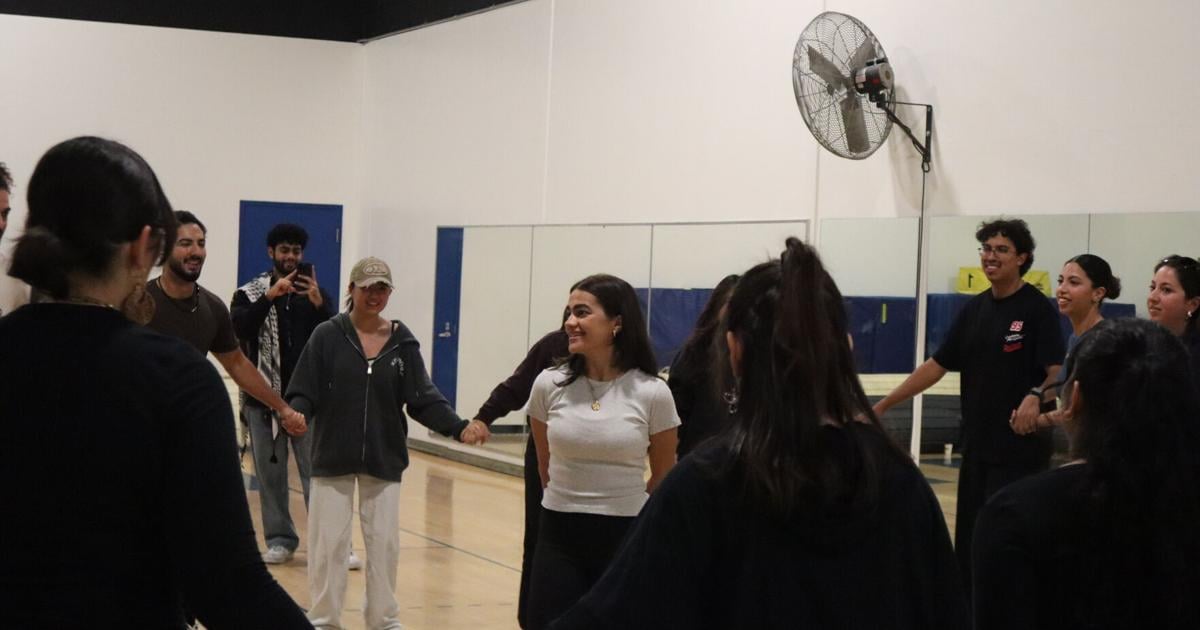The SouthWest Asian North African Club and Resource Center gave Cal State Fullerton students a taste of the upbeat music and dynamic movements of the traditional Levantine Dabke dance at their Thursday workshop.
This event, featuring Palestinian dance troupe El-Funoun, combined education with community as students and staff engulfed themselves in Dabke while learning about and destigmatizing the culture it comes from.
Nadia Al-Said, SWANA Resource Center coordinator, helped organize the event alongside the student-run SWANA club on campus. The SWANA Resource Center opened as a part of CSUF’s Diversity Initiatives Resource Center last year.
“It’s a new center — ‘SouthWest Asian North African,’ is a decolonial term to describe the Middle East,” Al-Said said. “This year, I wanted to come up with programs that would be engaging and educational, but more in a practice way, and not so much as a classroom lecture kind of way.”
Open to all students, the workshop featured simple yet spontaneous routines that allowed everyone to work together and learn more about this style of dance from the Levant region.
“Being able to have both SWANA and non-SWANA students as you see here, engage in a workshop like this, of cultural production, dance and music, it really allows for people to destigmatize our people and our cultures, and to learn the history and the background, and engage in something that’s new,” Al-Said said.
Al-Said was connected with El-Funoun through Sawa SoCal, who were excited to connect with college students as a Palestinian non-profit that usually works with children. With this event, Al-Said was not only able to provide community for the students at CSUF, but also for herself.
“I am a Palestinian, and so a lot of times, our identity is associated with a lot of trauma and violence and just a lot of repression and oppression that has happened to our people throughout history,” Al-Said said. “Being able to have a space where we’re experiencing joy with one another and sharing our joy as Palestinians, sharing our heritage with one another – I really hope the students get to feel that joy today.”
Similarly, Reem Joudeh, an El-Funoun dancer who joined the troupe when she was eight, sees Dabke as a powerful tool in bringing her closer to her heritage.
“For me, it’s about the connection with the land and also connection with the people that I’m dancing with,” Joudeh said. “I think Dabke also brings out my personality — my real personality — on the stage. Everybody says that on the stage I will be smiling all the time because I really enjoy it and it brings out the best of me.”
For Joudeh, Dabke is not only just a part of her life, it was woven into her childhood. Growing up in a family where music and movement came together, she found her inspiration to join El-Funoun close to home.
“We’ve been dancing for a really long time. My uncle is a dancer there,” Joudeh said. “I was inspired by him, and since I was a kid, even before joining El-Funoun, I was always loving to move, to dance and to express myself with dancing and with Dabke specifically.”
This connection extends beyond just family. Dabke, as Joudeh describes it, is rooted in her heritage but is also ever-changing.
“Dabke wasn’t started by professional dancers. It was started by farmers, just working together and enjoying and having fun together and making this connection with the ground,” Joudeh said. “We also take inspiration from other dances, like hip-hop, like African dance, like ballet. So we mix, we use our souls in it and our culture — that’s how we make it.”
Joseph Mudawar, a second-year business major and honorary SWANA club member, has big hopes for what people will gain from coming to events like these.
“They will learn about the tradition and the culture,” Mudawar said. “They will get informed on what something really is and the story behind it.”

